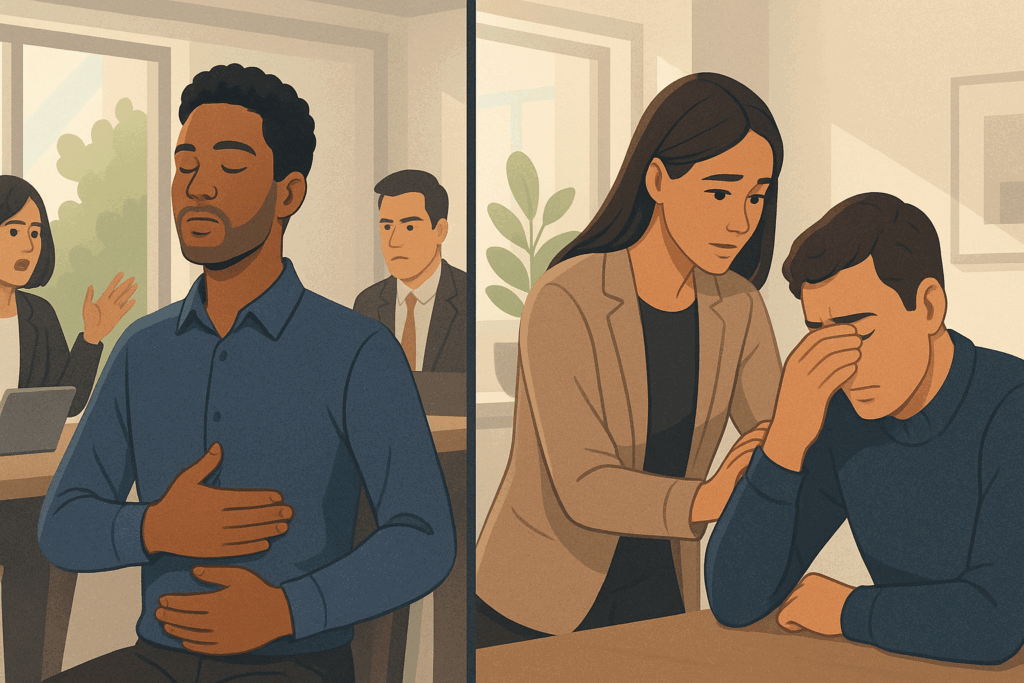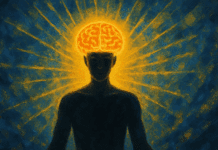Introduction: Building the Foundation of Mental and Social Health
In an era defined by constant change, digital hyperconnectivity, and societal pressures, cultivating essential habits that nurture long-term mental and social health is more critical than ever. These dimensions of wellness, while interrelated, each require deliberate care, attention, and proactive development. A person who is mentally healthy is not simply one who avoids illness but someone who actively nurtures resilience, emotional regulation, interpersonal fulfillment, and purpose. Sustaining mental and social health demands a comprehensive lifestyle approach that integrates mindset, behavior, and community dynamics.
You may also like: The Essential Mental Shift: How to Train Your Mind to Be Stronger for Peak Performance
For many, the question arises: how can I improve myself mentally while also fostering healthier relationships and emotional well-being? The answer lies in sustained practices rooted in evidence-based psychology and behavioral science. This article explores the foundational strategies that contribute to long-lasting emotional strength and social cohesion. From the development of emotional intelligence and mindfulness to sleep hygiene, nutrition, and community involvement, each section presents key principles that shape the fabric of mental and social health. These insights not only address how to maintain mental health on a daily basis but also illuminate the long-term benefits of cultivating stability, connection, and growth-oriented living.

Understanding the Interplay Between Mental and Social Health
Mental and social health are deeply interwoven, influencing one another in cyclical patterns that either foster growth or perpetuate dysfunction. Mental health refers to our emotional, psychological, and cognitive well-being, encompassing how we think, feel, and act in response to life’s challenges. Social health, on the other hand, reflects the quality of our relationships and our ability to form meaningful connections, maintain boundaries, and engage within diverse communities.
A person who is mentally healthy often demonstrates the skills necessary to sustain nurturing relationships—including empathy, communication, and emotional regulation. These competencies enhance one’s ability to collaborate, resolve conflict, and participate in collective spaces. Likewise, supportive social environments serve as protective factors against psychological decline. When individuals feel seen, heard, and valued by others, they are more likely to experience reduced anxiety, increased optimism, and a reinforced sense of identity.
Understanding this interdependence also underscores the importance of community-based interventions and public mental health awareness campaigns. Promoting mental health awareness and positive mental health at a societal level contributes to more resilient networks and reduces stigma. When both individuals and institutions invest in strategies that support well-being, they contribute to a collective culture that prioritizes inclusion, safety, and empathy.

Daily Practices That Strengthen Mental and Social Health
Sustaining long-term wellness requires not only addressing crises when they arise but adopting preventive measures that become habitual. One of the best practices for emotional health includes establishing a consistent daily routine. This may involve structured wake-up and sleep times, balanced meals, movement, journaling, or time for meaningful interactions. Routines instill predictability and agency—two psychological buffers against chaos and uncertainty.
Another core daily practice is deliberate emotional check-ins. Taking five minutes in the morning or evening to assess one’s emotional state, identify underlying thoughts, and name specific emotions can cultivate emotional granularity. Over time, this increases one’s capacity for nuanced emotional understanding and contributes to self-awareness—a foundational trait for emotionally healthy individuals. For those exploring how to heal yourself mentally or how to improve yourself mentally, this introspective habit forms the cornerstone of mental self-care.
Socially, integrating acts of kindness or brief, meaningful conversations into daily life can significantly enhance one’s sense of belonging. Even small efforts, like complimenting a colleague or checking in on a friend, can reinforce social bonds and foster mutual trust. These micro-interactions serve as emotional nutrients that help maintain social health over time, especially when deeper conversations are less frequent.

Emotional Intelligence and Self-Regulation as Lifelong Skills
Central to the goal of improving mental and social health is the development of emotional intelligence—a multidimensional construct that includes self-awareness, self-regulation, motivation, empathy, and social skills. While some may view emotional intelligence as a fixed trait, research supports the idea that these competencies can be learned and refined over time through reflection, feedback, and intentional practice.
Self-regulation, a key element of emotional intelligence, allows individuals to manage disruptive emotions and impulses effectively. In high-stress or emotionally charged scenarios, people who can pause before reacting, reflect on the situation, and respond constructively demonstrate greater mental stability and relational maturity. Strengthening these skills also supports efforts toward how to fix myself mentally and emotionally, providing a roadmap for calmer, more thoughtful decision-making.
Empathy, another critical component, allows individuals to resonate with others’ feelings and perspectives without losing their own sense of identity. Practicing active listening, asking open-ended questions, and suspending judgment can deepen one’s empathetic response. This builds relational trust and fosters inclusion, which are central to a healthy social fabric. For those curious about what impacts mental health, a lack of empathetic environments can often be a key factor in emotional decline.

The Role of Sleep and Nutrition in Mental Health Maintenance
While psychological strategies play a central role in maintaining wellness, physiological factors such as sleep and diet are equally vital. Sleep is not merely a rest period but a fundamental biological process that supports memory consolidation, emotional processing, immune function, and neurological regulation. Sleep deprivation, even in small doses, can significantly impair decision-making, increase irritability, and exacerbate symptoms of depression and anxiety.
Establishing good sleep hygiene involves creating a consistent bedtime routine, limiting blue light exposure before bed, and ensuring a cool, dark, quiet sleep environment. For those asking how to fix my mental health, improving sleep patterns often produces immediate benefits in cognitive clarity and emotional resilience. It is also advisable to avoid caffeine and alcohol close to bedtime, as these substances disrupt circadian rhythms and reduce restorative sleep quality.
Nutrition, similarly, impacts neurotransmitter function and brain chemistry. Diets rich in omega-3 fatty acids, antioxidants, whole grains, and fermented foods have been linked to lower rates of depression and anxiety. On the contrary, diets high in refined sugars and processed ingredients may promote inflammation and mood instability. A balanced diet supports the physical conditions necessary for stable mood and sustained focus, contributing meaningfully to mental and social health.

Mindfulness and Meditation for Mental Resilience
Among the most researched tools for cultivating mental well-being is mindfulness, defined as the practice of present-moment awareness with an attitude of curiosity and non-judgment. Mindfulness interrupts automatic negative thought loops and facilitates greater emotional regulation, improved attention, and a deeper sense of peace. It can be practiced through formal meditation, mindful breathing, body scans, or even daily tasks performed with intentionality.
Numerous studies have demonstrated that mindfulness-based interventions reduce symptoms of depression, anxiety, and stress. Mindfulness is not just a relaxation technique—it is a mode of being that rewires the brain over time, particularly the prefrontal cortex and amygdala, which govern executive functioning and threat detection. As such, mindfulness is a core method for those pursuing how to take care mental health on a proactive, ongoing basis.
Importantly, mindfulness enhances social awareness and attunement. When practiced consistently, it helps individuals notice subtle emotional cues in others, regulate their own reactions, and respond with greater empathy. In this way, it is both a personal and interpersonal tool, enhancing mental and social health simultaneously. For those wondering how to improve myself mentally, incorporating ten minutes of mindfulness daily is a foundational step toward mental clarity and relational depth.

Positive Habits That Elevate Mental and Social Health
A robust set of habits forms the backbone of positive mental and social health over time. Among these, gratitude stands out as a powerful emotional amplifier. Regularly acknowledging what is going well, no matter how small, rewires the brain to notice abundance over deficit. Gratitude journals, evening reflections, or spoken affirmations of appreciation can reorient one’s attention toward hope and resilience.
Equally essential is the habit of boundary setting. Healthy boundaries safeguard emotional energy, reduce burnout, and promote mutual respect in relationships. Individuals striving to understand how to heal yourself mentally often find that learning to say “no” without guilt and communicating needs clearly can transform both internal peace and social harmony.
Socially enriching habits like volunteering, joining affinity groups, or participating in mentorship programs also offer profound psychological returns. These practices reduce loneliness, increase self-worth, and create a feedback loop of belonging. They reinforce that mental health daily rituals are not limited to solitude but often flourish in meaningful togetherness. The collective benefits extend beyond personal gain to reinforce the broader fabric of social wellness.
Frequently Asked Questions: Advanced Strategies for Supporting Mental and Social Health
How does digital behavior influence mental and social health in the long term?
Digital behavior plays a critical but often underestimated role in shaping long-term mental and social health. Constant digital connectivity can create overstimulation, comparison anxiety, and even social disconnection, especially when social media becomes a substitute for in-person interaction. However, mindful technology use can actually enhance emotional resilience when platforms are curated for learning, support, or connection with aligned values. A person who is mentally healthy often sets clear boundaries with screen time, practices digital detoxes, and uses tech intentionally to foster rather than fragment relationships. Strategic tech use paired with in-person engagement can significantly elevate both mental and emotional health outcomes.
What are some emerging techniques in how to heal yourself mentally?
Recent developments in mental health technology and neuroscience are offering innovative answers to how to heal yourself mentally beyond traditional therapy or medication. Practices such as neurofeedback, which trains brainwaves using real-time EEG, and transcranial magnetic stimulation (TMS) are being explored for their potential to rewire thought patterns and elevate mood. Additionally, virtual reality is being used to treat phobias and PTSD by safely simulating exposure therapy environments. Complementary methods like forest bathing (Shinrin-yoku), narrative therapy, and expressive arts are also showing promise in reducing stress and enhancing self-reflection. Integrating these with best practices for emotional health allows individuals to create a multidimensional, sustainable healing process.
How do micro-decisions affect your ability to maintain mental health daily?
Micro-decisions, such as choosing to get up when the alarm rings or pausing before reacting in conflict, accumulate to influence your capacity to maintain mental health daily. These seemingly minor choices serve as building blocks for self-trust, discipline, and emotional agility. Over time, they shape identity and contribute to mental stability by reinforcing a sense of agency. When individuals consistently choose discomfort over avoidance in micro-moments, they build tolerance to stress and cultivate emotional maturity. This is especially powerful for those asking, “How can I improve myself mentally?” because the answer often lies in mastering the daily, not the dramatic.
How can introverts and extroverts approach mental and social health differently?
Mental and social health is not a one-size-fits-all endeavor, especially when considering personality dynamics. Introverts often replenish through solitude and deep one-on-one conversations, while extroverts may derive energy from group interactions and social stimulation. For introverts, practices such as journaling, solo creative projects, or nature immersion can significantly increase mental well-being. Extroverts might benefit more from community volunteering, group fitness, or team-based goals that align with their natural inclinations. Both types, however, must address how to maintain a healthy mental health routine by balancing energy input with recovery and customizing their social lives to sustain—not drain—their emotional bandwidth.
How do workplace dynamics impact mental emotional health and social cohesion?
Workplace dynamics are a profound yet often neglected factor in determining mental emotional health and broader social cohesion. Toxic work environments that reward hyper-competition, foster ambiguity, or ignore boundaries erode trust and increase stress. In contrast, psychologically safe workplaces encourage autonomy, open feedback, and inclusivity, which are essential for people seeking how to increase mental health without sacrificing ambition. Leadership plays a vital role here; managers who model vulnerability and self-regulation create a culture where others can thrive emotionally and socially. Encouraging mental health ideas like midday mindfulness sessions, flexible hours, and peer support programs contributes meaningfully to sustained organizational wellness.
What is the relationship between creativity and mental health improvement?
Creative expression is increasingly being recognized as both a preventive and therapeutic tool in mental health improvement. Activities such as painting, writing, dancing, or even cooking can act as emotional regulators by providing a non-verbal outlet for complex feelings. Neuroscience suggests that creative engagement boosts dopamine levels and enhances neuroplasticity, both of which support mental well being. Engaging in creative hobbies also nurtures curiosity, which is vital for how to fix myself mentally and emotionally after periods of stagnation or trauma. As creativity often thrives in collaborative or shared environments, it can also serve as a bridge to improved social health and deeper communal ties.
How do intergenerational relationships support mental and social health?
Intergenerational relationships are a rich, underutilized resource in promoting long-term mental and social health. These connections foster a broader sense of perspective, reduce age-related biases, and create mentorship opportunities that benefit both older and younger participants. For younger individuals, elders often provide wisdom, emotional grounding, and long-term thinking—all components of mental well being meaning. For older adults, engaging with youth offers vitality, technological literacy, and reduced feelings of isolation. Structured programs in schools, religious communities, and civic organizations that facilitate these interactions can significantly strengthen the social fabric and contribute to positive mental health facts at every age.
How can you improve your emotional health through physical movement?
Physical movement isn’t just a tool for cardiovascular fitness—it’s a dynamic intervention for those exploring how can you improve your emotional health through embodied experience. Aerobic activities like swimming or cycling release endorphins and elevate serotonin levels, providing natural mood enhancement. Practices like yoga or tai chi blend breath control, intentional movement, and mindfulness, aligning mental emotional health with somatic awareness. Even brief daily walks can reduce cortisol levels, sharpen focus, and encourage problem-solving. By approaching exercise as a form of emotional recalibration rather than solely physical exertion, individuals can better understand what impacts mental health from a whole-body perspective.
Why is setting boundaries a cornerstone in how to take care mental health?
Setting boundaries is one of the most empowering and under-discussed strategies in how to take care mental health sustainably. Boundaries define where others end and we begin, offering clarity, safety, and emotional autonomy. Without them, individuals are prone to emotional enmeshment, burnout, and chronic stress, all of which undermine mental stability. Learning to say no, delay responses, or renegotiate expectations protects energy and prevents resentment. It also teaches others how to engage respectfully, thereby enhancing both personal dignity and social harmony—two essentials for those wondering how to fix my mental health and sustain it long-term.
How does spiritual practice intersect with the meaning of mental health?
For many, spiritual practice offers an existential framework that complements the scientific pursuit of understanding the meaning of mental health. Whether through prayer, ritual, nature immersion, or acts of service, spirituality provides a sense of coherence that can buffer against despair, especially during life transitions or crises. It invites people to reflect on purpose, interconnection, and inner wisdom—all of which enhance mental well-being. Furthermore, spiritual communities often provide strong social ties, adding depth to social health by promoting shared values and collective healing. Incorporating spiritual exploration can be particularly transformative for those wondering how to maintain mental health while navigating complexity and uncertainty in modern life.
How to Sustain Motivation for Mental Health Daily Habits
Maintaining momentum in mental health daily routines often requires shifting from willpower to ritual. One powerful strategy involves stacking new habits onto existing ones—for example, practicing gratitude while brushing your teeth or journaling after your morning coffee. For individuals asking how can I improve my mental and emotional health consistently, tracking micro-wins in a visible way can reinforce commitment and spark dopamine-driven motivation. It’s also useful to connect mental health improvement goals with identity (“I am someone who takes care of myself”) rather than outcomes (“I want to be less anxious”). This identity-based approach is a cornerstone of behavior science and supports long-term mental and social health without relying solely on fleeting inspiration.
Conclusion: Anchoring Mental and Social Health for Life
To truly understand the meaning of mental health, one must recognize that it is not a fixed destination but a dynamic, lifelong journey. It is a process of continual adjustment, nourishment, and growth that calls for intentional action every day. Developing mental stability and social well-being is not reserved for moments of crisis but is most effectively achieved through daily effort, community engagement, and self-awareness.
Each strategy presented in this article addresses different facets of the broader goal: how can you improve your emotional health while also strengthening the social bonds that sustain you? The answer is found in the synergy between evidence-based psychological techniques, physiological wellness, and relational investment. Whether you’re working on how to maintain a healthy mental health lifestyle or discovering the mental well-being meaning that resonates with your life philosophy, the key lies in consistent, meaningful habits.
We thrive not in isolation but through interconnectedness. Embracing practices that elevate both individual strength and collective harmony empowers us to lead lives marked by balance, fulfillment, and resilience. As we collectively move toward greater understanding of psychology and mental health, let us ground our efforts in compassion, intention, and the awareness that the path to long-term well-being begins with the everyday choices we make.
Ultimately, investing in essential habits that support long-term mental and social health is one of the most powerful, enduring acts of self-care and community care. The journey may be ongoing, but each step taken is a vital contribution to a more emotionally intelligent, connected, and mentally stable world.
Further Reading:
Our best mental health tips – backed by research
8 Daily Habits to Boost Mental Health — and Signs It May Be Time to Get Support





